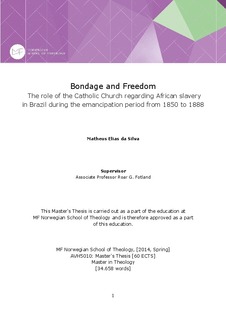| dc.description.abstract | The present research will focus on what was the role of the church in the slavery practice during the emancipation period. The emancipation acquired relevance by the year 1850 when it was enacted
the law which prohibited the arrival of Africans as slaves in Brazil through the transatlantic slave
trade. Nevertheless, the newborn children of slaves were considered slaves as well and only on
September 28th, 1871 the law of the free womb was promulgated.2 The struggle for emancipation
culminated with the signing of the Golden Law setting all slaves free on May 13th, 1888.
The slavery era had an end in the Brazilian society in 1888 and the Roman Catholic
Church had being there since the discovery of the land. Bearing that in mind a main question is
raised: What was the role of the Roman Catholic Church regarding slavery in Brazil during the
emancipation period from 1850 to 1888? In order to answer this main question there are others
sub-questions (1) what were the teachings and practices of the church regarding the African slavery
prior to the emancipation, when the dream of freedom was only an utopia?; and (2)what were the
teachings and practices of the church regarding the African slavery during the emancipation period?
The research will focus on theory, the theology taught, and on practice - the example of the clergy
to the society.
I had as a pre-understanding
that the church changed her opinion about the African slavery in Brazil during the emancipation
period. I did not find any document which proves that the RCC and her clergy in Brazil had openly
condemned the African slavery system as such before the emancipation period. We found some
archbishops who advised the slaves owners to treat well their slaves, and even to teach them the
Catholic faith, but it does not imply that they were against the slavery system as such. As presented
before, the first important step to emancipation was taking in 1850 when the law of the free womb
was promulgated and the transatlantic slave trade came to an end. Until there, the RCC, as far I
could research in the primary sources, did not stand up against the enslavement of the Africans,
neither in teaching nor in practicing. Therefore, I have confirmed that when it comes to the
enslavement of Africans, the RCC changed its moral teachings and practices to suite the times. | nb_NO |
